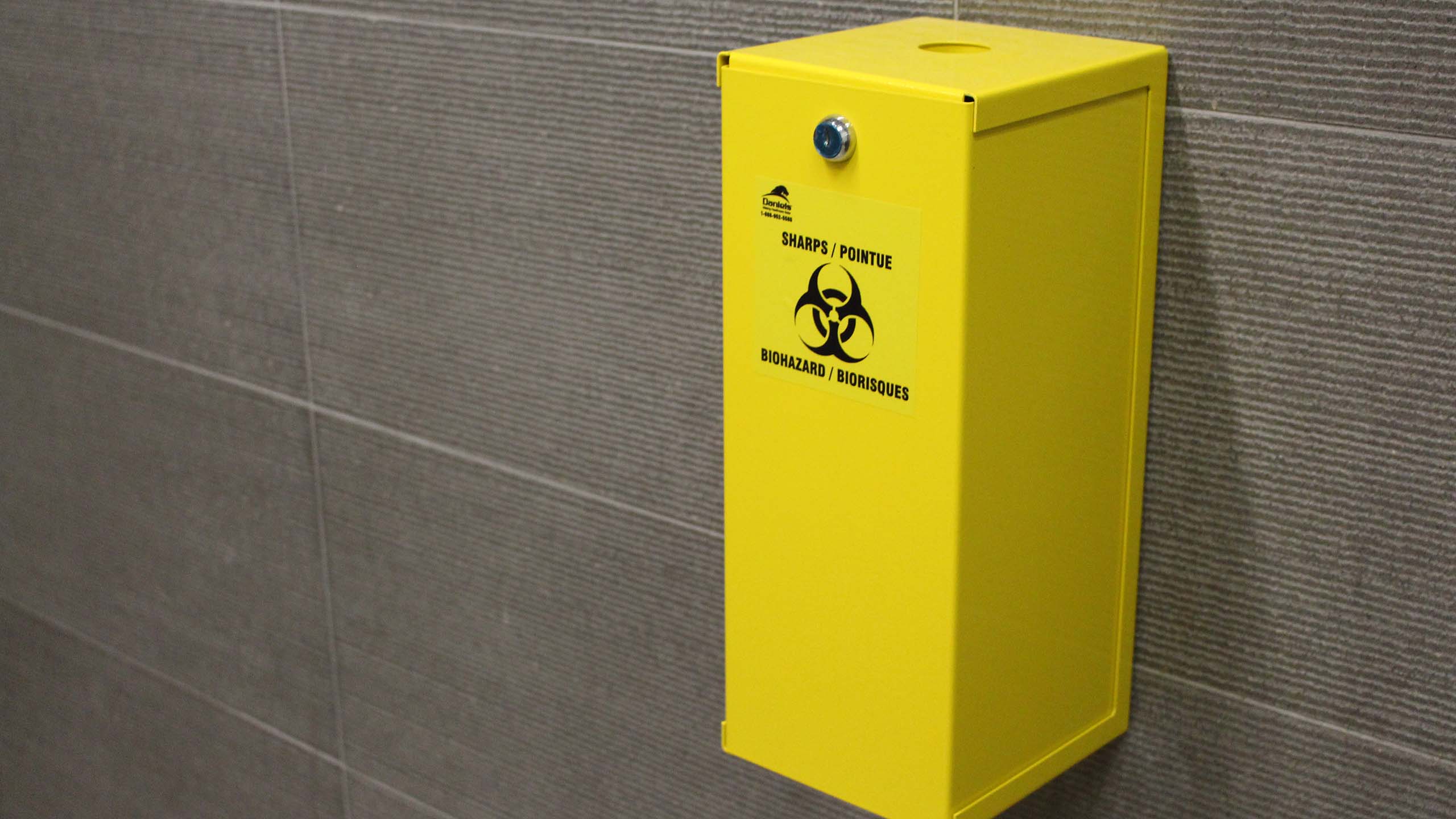By Maggie Macintosh
Ryerson University will install sharps disposal containers in 510 more washrooms on campus by July 2019, The Eye has learned.
More yellow disposal boxes—for students and staff to dispose of needles and other sharp objects—will be installed in all Ryerson-owned buildings, Facilities Management and Development (FMD) said in a statement.
The expansion is a result of the success of the sharps disposal container pilot program launched earlier this year.
“The pilot program has demonstrated that the sharps disposal containers are being actively used,” FMD said. “This has successfully reduced the number of sharps found in trash bins, on washroom floors, on the ground outside campus buildings and flushed down the drain in some washrooms.”
FMD launched the pilot in February, when they installed sharps disposal containers in 18 “high occurrence risk” washrooms on campus. “Sharps” can be classified as an object with the ability to cut the skin such as needles, scalpels, razor blades, scissors and pins, according to the Canadian Centre for Occupational Health and Safety.
The containers were installed in ground-level washrooms in Jorgenson Hall, Kerr Hall North, Eric Palin Hall, the Student Learning Centre, Chang School, Victoria Building, Rogers Communications Centre, George Vari Engineering and Computing Centre, the Student Campus Centre and Oakham House buildings.
The new boxes will be installed in two phases. First, containers will be installed in the remaining ground-level washrooms of all Ryerson-owned buildings. Then, the university will install containers in the remaining washrooms between January and June 2019.
“There’s a concern that if you put sharps containers in washrooms, that will attract more drug use in those washrooms, and that’s a real misconception,” said Kim Bailey, a harm reduction expert who is also the director of outreach, community engagement and partnership development in the Faculty of Community Services at Ryerson.
Individuals have always used drugs in washrooms because they are “relatively clean” spaces where they can take or inject illegal substances that are highly stigmatized in private, Bailey said. And, as evidence from the university’s six-month pilot shows, she said containers simply encourage the safe disposal of their sharps.
Alannah Fricker, president of the Ryerson chapter of Canadian Students for Sensible Drug Policy, said the university’s move to install hundreds more containers “is really important and it makes me really happy.”
However, Fricker said sharps containers, while an important harm reduction response, shouldn’t be the only response when it comes to addressing the needs of Ryerson community members who use drugs.
Both Bailey and Fricker said the university should continue to explore ways to support students and staff who use drugs and those with addictions, such as offering harm reduction counselling support and providing community members with access to clean needles.
The Centre for Student Development and Counselling at Ryerson offers both individual and group counselling sessions for students, but there are no ongoing harm reduction or addictions-specific services.
The university’s website directs people seeking information about addictions to the Centre of Addiction and Mental Health (CAMH).
“There should be a lot more access because the reality is people are using drugs,” Bailey said, adding that the goal of harm reduction is to “meet people where they’re at” and provide them with the supplies they need to stay safe from overdose and blood-borne infections.
“Luckily, we’re right next door to a needle exchange program,” she said.
The Works, a Toronto Public Health building at the corner of Victoria and Dundas streets, houses a supervised injection site—a drop-in program where users can inject pre-obtained drugs indoors, under the supervision of trained professionals.










Leave a Reply